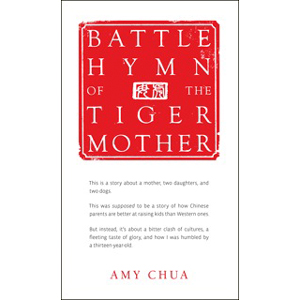
The Battle Hymn of the Tiger Mother by Amy Chua
 I chose to blog about The Battle Hymn of the Tiger Mom by Amy Chua in the hope that reading the book would motivate me to become more disciplined, make me more eager to demand excellence not only from my daughters but also myself. But it’s actually had the opposite effect. I find myself reaching for The Idle Parent: Why Laid-Back Parents Raise Happier and Healthier Kids by Tom Hodgkinson.
I chose to blog about The Battle Hymn of the Tiger Mom by Amy Chua in the hope that reading the book would motivate me to become more disciplined, make me more eager to demand excellence not only from my daughters but also myself. But it’s actually had the opposite effect. I find myself reaching for The Idle Parent: Why Laid-Back Parents Raise Happier and Healthier Kids by Tom Hodgkinson.
Ultimately, Chua is no closer to answering the age-old question of how to live a full life than I am. This is not only the result of her rebellious, younger daughter but also her sister’s fight against leukemia. After two rounds of grueling chemotherapy and a harrowing bone marrow transplant, what Chua’s sister wanted more than anything else was to just “be” with her children – hugging, kissing, cuddling – and the reader sees the impact of this experience on Chua’s parenting style.
Chua questioned her original intentions, “By squeezing out so much from every moment of every day, perhaps I imagined that I was buying myself more time. As a purely mathematical fact, people who sleep less live more.” But practicing the violin every chance they got wasn’t what her youngest daughter had in mind. While vacationing in Russia, Lulu yelled, “You’re a terrible mother. You’re selfish. You don’t care about anyone but yourself. What – you can’t believe how ungrateful I am? After all you’ve done for me? Everything you say you do for me is actually for yourself.”
As a result, Chua concedes to the Western parenting method of choice, which she’d “made a career out of spurning.” Slowly, she and her daughter rebuilt their relationship. Lulu dramatically reduced her violin playing and pursued tennis without interference from her mother. When Chua admits that “for the first few weeks after Lulu’s decision, I wandered around the house like a person who’d lost their mission, their reason for living,” I could empathize, but it also made me question, once again, Chua’s motivation behind her extreme form of parenting.
Before concluding, Chua does go off on one last tangent about the superiority of Chinese parenting. “When their kids fail at something, instead of telling them to work harder, the first thing Western parents do is bring a lawsuit!” While this final monologue mirrors the arrogance of the book’s opening, I found myself forgiving Chua since she’d shared accomplishments and failures so honestly.
The part I think Chua gets right is the need to question. In the teaching world, we call this being a reflective practitioner. While Chua says not enough Western parents question, the story of her own father’s isolation from his family as a result of extreme Chinese parenting indicates we’re not the only ones in need of questioning our norm. “When Chinese parenting succeeds, there’s nothing like it. But it doesn’t always succeed.”
I think the reason parenting is so hard is because not only are our children always changing so are we. We can’t adopt one parenting method and stick to it; rather our parenting practices, like our personas, must keep evolving. Therefore, if neither the Chinese way of controlled discipline nor the Western way of creative choice works, I’m thinking the Universal way should be balance. Perhaps that will bring us all the happiness we seek.
Don’t forget to like Parenting by the Book on Facebook for updates on blog posts.
Follow Befriending Forty at http://befriendingforty.blogspot.com and find out what happens when the person I thought I’d be meets the person I actually became.






